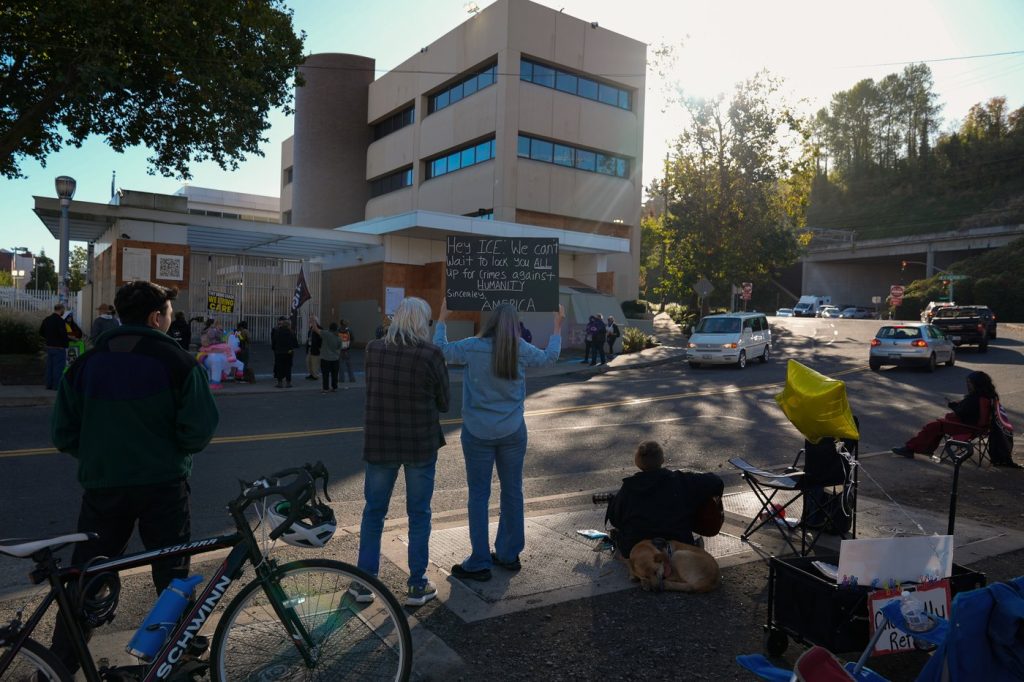PORTLAND, Ore. (AP) — A federal judge in Oregon issued a ruling on Sunday that prevents President Donald Trump’s administration from deploying the National Guard to Portland until at least Friday. The decision came after U.S. District Court Judge Karin Immergut, a Trump appointee, found insufficient evidence to support claims that protests in the city had escalated out of control prior to the federalization of troops. The ruling follows a lawsuit filed by the city and state of Oregon in September against the deployment of National Guard troops.
The legal battle reflects ongoing tensions in Portland, Chicago, and other U.S. cities where the Trump administration has sought to federalize and mobilize the National Guard in response to protests. During a three-day trial, both sides presented their arguments regarding whether the protests at the U.S. Immigration and Customs Enforcement (ICE) building in Portland met federal law requirements necessary for the deployment of military personnel. Judge Immergut indicated she would issue a final ruling on Friday, citing the extensive evidence presented during the trial, including over 750 exhibits.
In her 16-page ruling, Immergut stated that the administration's claims regarding protest violence were exaggerated. She noted that most of the altercations appeared to involve clashes between protesters and counter-protesters, asserting that there was no significant damage to the ICE facility, which was central to the protests. "Based on the trial testimony, this Court finds no credible evidence that during the approximately two months before the President’s federalization order, protests grew out of control or involved more than isolated and sporadic instances of violent conduct that resulted in no serious injuries to federal personnel," she wrote.
The complexities of the case emerge amid broader legal disputes involving cities governed by Democrats, like Chicago, which is pursuing a separate lawsuit to prevent military involvement. These cities argue that the legal standards for troop deployment have not been met and assert that such actions violate state sovereignty. The Trump administration contends that the deployment is necessary because local forces have been unable to manage the situation effectively, which is part of the legal justification for calling up troops under federal law.
Prior to the trial, Judge Immergut had issued two orders in early October to block the troop deployment, asserting that Trump had not demonstrated he fulfilled the legal criteria for mobilizing the National Guard. She criticized Trump’s characterization of Portland as "war-ravaged with fires all over the place" as "simply untethered to the facts." Though a three-judge panel from the 9th U.S. Circuit Court of Appeals had paused one of Immergut’s orders, the appeals court subsequently vacated that decision and agreed to re-examine the matter with an 11-judge panel. Until that is resolved, an earlier order which federalizes the National Guard without deploying them remains effective.
Throughout the trial, witness testimonies from local police and federal officials explored law enforcement responses to the protests outside the ICE building. The protests escalated significantly in June, prompting the police to declare one incident a riot, but attendance at protests declined significantly in the months that followed. The Trump administration argued it was forced to reallocate federal agents from other locations to manage the unrest in Portland, describing the situation as a "rebellion" or a "danger of rebellion," conditions under which troops could be mobilized according to federal law.
Testimonies included assertions by officials from the Federal Protective Service that a troop deployment would help alleviate staffing pressures. However, one official, identified only by initials due to safety concerns, expressed surprise at the planned deployment, stating he was not consulted about it and disagreed with assertions about Portland being ablaze. The Oregon legal team highlighted that city police could manage the protests without federal assistance, adjusting their strategy to only intervene in the case of personal or property crimes. According to court documents, the ICE building had to close for three weeks during the summer due to property damage, but the officials testified that operations were maintained from a different location during that period.
Oregon Senior Assistant Attorney General Scott Kennedy summed up the legal position by stating that the incidents of violence during the protests did not support the notion of a rebellion or an inability to enforce the law. As the legal proceedings continue, the intricacies of federal and state authority in maintaining public order remain at the forefront of discussions surrounding the deployment of National Guard troops in urban environments.











